

"Whose is the Bible?"
This question invites a range of responses. It could point to issues of copyright in different translations or to the various religious traditions that claim the Bible as their own, asserting their right to interpret its meaning. Perhaps the simplest answer is found on the cover of many editions: "God's Word." Yet, beyond questions of ownership or control, this question also touches on something deeper. The Bible is not merely possessed—it shapes, forms, and transforms t...
"Whose is the Bible?"
This question invites a range of responses. It could point to issues of copyright in different translations or to the various religious traditions that claim the Bible as their own, asserting their right to interpret its meaning. Perhaps the simplest answer is found on the cover of many editions: "God's Word." Yet, beyond questions of ownership or control, this question also touches on something deeper. The Bible is not merely possessed—it shapes, forms, and transforms those who engage with it. In this sense, the question of "whose" the Bible is may be less about who owns it and more about who is being shaped by it.
View more
Comments (3)
More Episodes
All Episodes>>You may also like
Create Your Podcast In Minutes
- Full-featured podcast site
- Unlimited storage and bandwidth
- Comprehensive podcast stats
- Distribute to Apple Podcasts, Spotify, and more
- Make money with your podcast
It is Free












